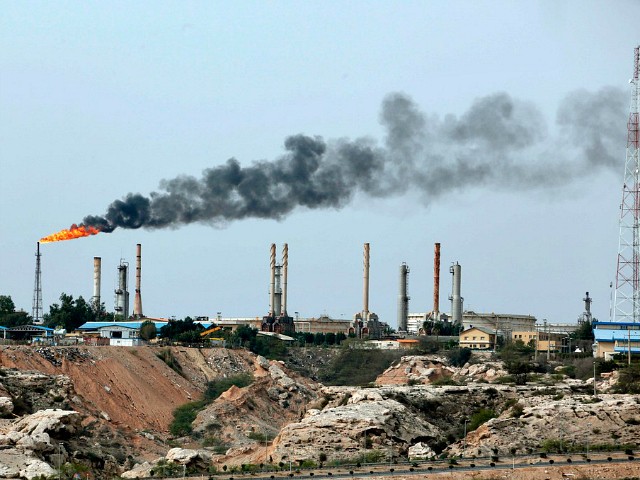
The unprecedented wave of economic sanctions imposed on Iran by U.S. President Donald Trump’s administration is “on track” to reduce Tehran’s coffers by “$50 billion” in oil revenue alone, the American special representative for the Islamic Republic told reporters on Friday.
Saudi Arabia’s Al Arabiya quotes the U.S. Department of State (DOS) diplomat Brian Hook as telling reporters in London on Friday:
We will intensify sanctions on Iran until it decides to be a normal state. … We will sanction any illicit purchases of Iranian crude oil. We are on track to deny Iran $50 billion in oil revenue alone. Iran does have a history of using front companies to evade sanctions and enrich the regime and fund its foreign adventurism.
Radio Farda, a component of Radio Free Europe/Radio Liberty (RFE/RL), notes that “since the imposition of U.S. sanctions on Iran in 2018, daily oil exports have dropped from more than two million barrels a day to around 300,000.”
In a Bahrain-based interview with Al Arabiya, published on Wednesday, Hook also said Iran’s proxies in the region, including terrorist groups Lebanese Hezbollah and Palestinian Hamas as well as Shiite militias in Iraq and Syria, “are experiencing a financial strain they never experienced before” as Iran feels the crunch from the sanctions.
Hook’s comments echoed testimony he gave before a U.S. House panel on June 19. The top diplomat told lawmakers the Trump restrictions are forcing Hezbollah to beg for spare change and place “piggy banks” in stores.
Hook said the sanctions are “working,” noting that it has hindered Iran’s ability to expand its military capabilities and fund terrorist groups.
“Today by nearly every metric the regime and its proxies are weaker than when our pressure began. … Our pressure campaign is working. It is making Iran’s violent and expansionist foreign policy cost prohibitive,” he told the House panel.
The State official did concede that Tehran still poses an asymmetric warfare threat.
“Iran still, even with very little revenue has asymmetric capabilities that terrorists have,” he testified, noting that Tehran has responded to the sanctions with violence.
Hook pointed out that Tehran pays for 75 percent (about $700 million) of Hezbollah’s budget every year. Nevertheless, he said the U.S. has been able to reduce Iran’s ability to fund terror. Iran and Hezbollah maintain a substantial presence in the United States’ backyard, Latin America.
Iran has routinely gloated about its ability to dodge U.S. sanctions, particularly on its oil exports, saying the United States is unable to prevent the Islamic Republic from selling its oil.
President Trump took the United States out of the controversial 2015 Iran nuclear deal, arguing that the pact was not tough enough on the Islamic Republic. The Trump administration reimposed the sanctions suspended under the accord as part of an unprecedented wave of economic restrictions imposed on Iran’s energy, banking, and shipping sectors, among others.
U.S.-Iran tensions have intensified amid the Trump administration’s maximum pressure campaign. The tense relationship reached a boiling point when Iran shot down an American drone last week. In the wake of the incident, President Trump imposed new sanctions on Iran, including the country’s Supreme Leader Ayatollah Ali Khamenei.
via Breitbart News
Enjoy this article? Read the full version at the authors website: https://www.breitbart.com
